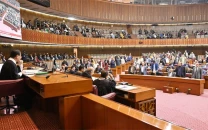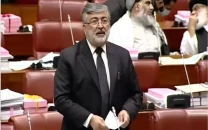Countering terror
India needs to push diplomacy to its outer limits so that the Pakistani state can deter non-state actors.

Two years after the Mumbai attacks, India has to thank its lucky stars that there has been no repeat of 26/11. But several attacks — one in Pune, another in Bangalore, one just before the Commonwealth Games at Delhi and one last week in the temple town of Varanasi — were, according to reports in the Indian media, carried out by the Indian Mujahideen, a subsidiary of the Pakistan-based Lashkar-e-Taiba (LeT). Fourteen other strikes were thwarted by intelligence and counterterrorism cooperation with the US, UK, Germany and Israel.
On the second anniversary of 26/11, the US was quick to issue a message of solidarity. It has banned Falahi Insaniyat Foundation, a cover for LeT, and declared three of its agents as global terrorists. Meanwhile, the WikiLeaks drizzle has turned into a flood and we are told that Pakistan had a big role in preventing investigations into the Mumbai attack and that the US was aware of this. The perspective from New Delhi is: Pakistan is the US’s strategic ally and most favoured non-Nato partner in the war in Afghanistan. India is simply on its own in this game and needs to fortify its internal apparatus to prevent and pre-empt the next attack.
Chidambaram, who was in Mumbai on November 26, said: “Mumbai will show the way for other states”. Mumbai’s track record in preparations for countering terror, two years on, has not been very impressive. Only part of the 1.26 billion Indian rupees that was sanctioned immediately after 26/11 has been spent. A committee headed by former home secretary Ram Pradhan filed a report, the recommendations of which have not been implemented in full. Similarly, while the Indian Navy has issued elaborate papers on plugging gaps at sea through maritime domain awareness, little has been done in augmenting the capabilities of the Coast Guard.
Indian Finance Minister Pranab Mukherjee made a 30 per cent increase in the funding for internal security. In one state, at least, the money meant for enhancing policing skills was diverted to housing. Terrorist organisations are forever changing tactics and strategy but India is less than flexible in its response.
The question that periodically pops up is: What will India do if there is another attack sourced in Pakistan? It is a complicated question. Pakistan has an Islamic insurgency but it also has a separatist insurgency — Balochistan — the anatomy of which is quite different from other areas. So blindly punishing Pakistan for ‘adventures’ it undertakes in India would be highly ill-advised.
We come back to the same question — what can India do? It can put its own house in order and restart talks with Pakistan in which India counsels and advises the regime on the basis of its own experience in dealing with the insurgency. If the past two decades were about the rise of insurgencies in India, a new regime in Bangladesh and cooling tempers in (Indian) Punjab point to a new decade of declining insurgencies. India needs to be optimistic and push diplomacy to its outer limits in dealing with Pakistan so that the Pakistani state can deter non-state actors from taking advantage of India’s temporary preparedness deficit.
Published in The Express Tribune, December 14th, 2010.



















COMMENTS
Comments are moderated and generally will be posted if they are on-topic and not abusive.
For more information, please see our Comments FAQ